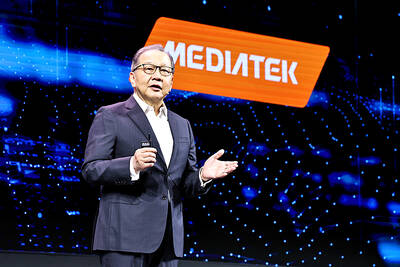The number of mobile service subscribers in the Asia-Pacific region outside of Japan is projected to exceed 901 million by 2009 after growing a robust 25.6 percent to 527.3 million last year, an industry monitoring group said yesterday.
For 2005, the number of mobile users is tipped to increase 18.6 percent to 625.5 million, research firm International Data Corp (IDC) said.
The strong growth is expected to translate into an earnings bonanza for telecom service providers with mobile revenues rising to US$109.3 billion in four years' time from US$69.8 billion last year, it said.
Of the 10 regional markets covered, India reported the fastest growth as mobile service users more than doubled to 48 million last year, with the figure projected to rise to 148.77 million in 2009.
China, the Philippines and Thailand, the key contributors behind the region's strong growth last year, will remain among the fastest growing markets, the report said.
In China, mobile users numbered 317.27 million last year and will grow to 535.37 million in 2009, with the Philippines rising to 57.46 million from 32.74 million last year and Thailand up to 39.9 million from 27.14 million.
"India's mobile services market saw an overnight expansion due to the conversion of wireless local loop services to full mobility services under the new universal licensing regime," Alayne Wong, IDC's regional research anager for wireless communications, said in the report.
"Other factors boosting growth in the region include increasing popularity of pre-paid plans as well as continued network expansion in emerging markets, extending the reach of mobile services."
Among other regional markets, IDC said Australian mobile users will rise from 17.86 million last year to 20.78 million by 2009, with Hong Kong going from 7.22 million to 8.31 million and Malaysia from 14.59 million to 22.49 million.
Singaporean users will rise from 3.86 million to 4.66 million over the same period, with South Korea increasing from 36.58 million to 40.48 million and Taiwan from 21.99 million to 22.81 million.

Japanese Prime Minister Sanae Takaichi has talked up the benefits of a weaker yen in a campaign speech, adopting a tone at odds with her finance ministry, which has refused to rule out any options to counter excessive foreign exchange volatility. Takaichi later softened her stance, saying she did not have a preference for the yen’s direction. “People say the weak yen is bad right now, but for export industries, it’s a major opportunity,” Takaichi said on Saturday at a rally for Liberal Democratic Party candidate Daishiro Yamagiwa in Kanagawa Prefecture ahead of a snap election on Sunday. “Whether it’s selling food or

CONCERNS: Tech companies investing in AI businesses that purchase their products have raised questions among investors that they are artificially propping up demand Nvidia Corp chief executive officer Jensen Huang (黃仁勳) on Saturday said that the company would be participating in OpenAI’s latest funding round, describing it as potentially “the largest investment we’ve ever made.” “We will invest a great deal of money,” Huang told reporters while visiting Taipei. “I believe in OpenAI. The work that they do is incredible. They’re one of the most consequential companies of our time.” Huang did not say exactly how much Nvidia might contribute, but described the investment as “huge.” “Let Sam announce how much he’s going to raise — it’s for him to decide,” Huang said, referring to OpenAI

CHIP HANG-UP: Surging memorychip prices would deal a blow to smartphone sales this year, potentially hindering one of MediaTek’s biggest sources of revenue MediaTek Inc (聯發科), the world’s biggest smartphone chip designer, yesterday said its new artificial intelligence (AI) chips used in data centers are to account for 20 percent of its total revenue next year, as cloud service providers race to deploy AI infrastructure to meet voracious demand. MediaTek is believed to be developing tensor processing units for Google, which are used in AI applications. While it did not confirm such reports, MediaTek said its new application-specific IC (ASIC) business would be a new growth engine for the company. It again hiked its forecast for the addressable ASIC market to US$70 billion by 2028, compared

SIGNS OF STABILITY: With US tariff risks to GDP subsiding, reliable economic conditions are expected to reinforce the bank operating environment, Fitch said Fitch Ratings has upgraded the outlook for Taiwan’s banking sector to “neutral” from “deteriorating,” citing a tariff agreement with the US that has reduced uncertainty in Taiwan’s macroeconomic environment and stabilized financial performance. The US on Jan. 15 agreed to lower tariffs on Taiwanese goods from 20 percent to 15 percent, without stacking them on existing most-favored-nation rates, placing Taiwan on equal footing with major competitors such as Japan, South Korea and the EU. The deal also grants Taiwan-made semiconductors and related products most-favorable-nation treatment under Section 232 of the US Trade Expansion Act. Under the agreement, Taiwanese semiconductor, electronics manufacturing service, artificial